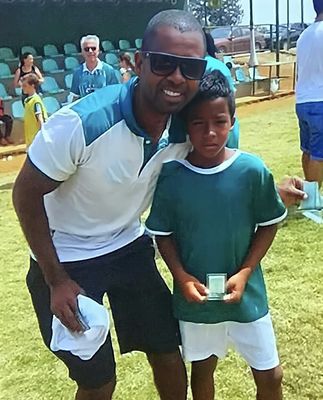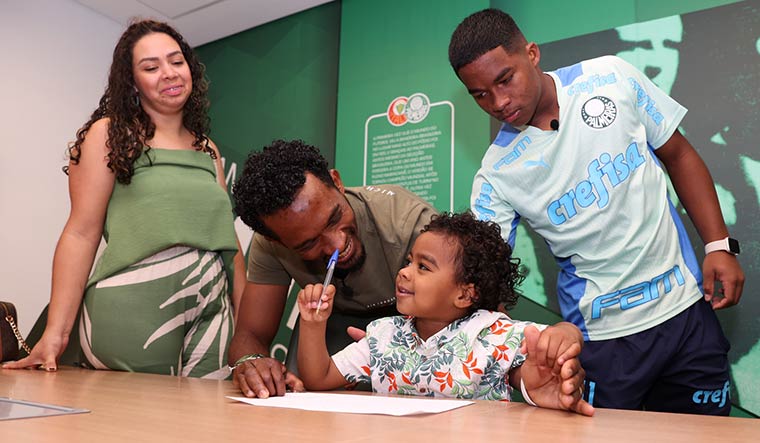It is one minute to 8am. The roll-up doors swing overhead, and the Supermercado Varejão grocery store in Valpariso De Goias, Brasilia, is open early. Customers materialise from the street; by 8am it looks like it has been open for hours. Out of its depths emerges a thin, unassuming young man in good shape and wearing a black polo T-shirt. Fabio Rodrigues dos Santos owns the store; he also owns an important part of one of the most remarkable stories in Brazilian football today.
Fabio played a crucial role in the discovery and evolution of Endrick Felipe Moreira de Sousa, the 16-year-old striker for top Brazilian club Palmeiras. He is the buzz in the football crazy nation and the rest of the footballing world, and English and European clubs wait for the day he turns 18, when he is officially eligible to sign a contract outside Brazil. Real Madrid and Barcelona are reportedly eyeing him, but the winning bidder will have to cough up over €60 million (nearly 0500 crore)—according to the release clause he signed with Palmeiras when he turned 16. The deal could even happen before Endrick becomes eligible to sign the contract, as it happened with fellow Brazilians Vinicius Junior and Rodrygo; Real Madrid had snapped them up for €45 million each.
Endrick knocked the ball around in Valparaiso, in the rural Capital District that surrounds Brasilia, but then humble beginnings figure in the childhood stories of many a Brazilian legend. Endrick came to Fabio when he was just a toddler, and he discerned something very special in the kid.
The year was 2010. Valparaiso, a gritty collection of residential buildings, had been designated a city only 15 years earlier. It was home to a hardscrabble lot, people struggling amid few possibilities. Fabio, then 27, had bought some farmland away from his store to start a football school. In Brazil, where people eat, breathe and sleep the great game, the venture was more of a social obligation than a business. He used to charge R$ 25 a month ($5) per student; those who could not afford it were trained for free. In a matter of a few months, the school had 300 students. Some of them showed enough promise that Fabio began looking for ways to develop them and place them in the farm systems of Brazilian clubs.
It was around this time that Douglas de Sousa Silva Ramos approached Fabio with a request to admit his four-year-old son Endrick to what was by then called Escolinha Gol de Letras—the little school of football. It was the only such school in the neighbourhood, but there was a catch. The school admitted only those above six, because the player’s body needed to be ready for the intensely physical game.
But Douglas, who knew Fabio from his playing days, persisted. Finally, Fabio agreed for a trial. Endrick had to play with boys nearly twice his age, and if he did not end up crying, he could stay.
“Endrick entered the field, bested the other boys and finished all of them,” recalled Fabio. “He scored goals, he dribbled, he tackled, he just ran circles around them.”
Fabio was impressed with the immense talent on two legs. “It is not just taking the ball, dribbling it and doing a few fancy plays,” he told THE WEEK. “One must have personality. If a child does not have personality, he will not make the cut. Endrick did that and much more as if it was the most normal thing in the world. He did not feel the pressure; it was obvious he was a mental player. He was very different from all the other kids.”
From that point on Fabio took Endrick under his wing, literally. It went beyond football. He would pick the boy up from his dark room dwelling when his parents were away, and give him a place at his grocery store till it was time for football. It was there, in that corner grocery store, sitting on the couch in the office, that the young boy would often have his only meal of the day. Fabio would look after him, take him to the doctor, the dentist, and to competitions around Brasilia to showcase his talent and pit him against the rest.
Endrick was the smallest on and off the field. What are you doing with that small boy, people would ask. “He is the future,” he would respond, and they would scoff at it.
“He is a child with a destiny,” Fabio told THE WEEK. “There are people with talent, people who can handle the ball, even score goals. But Endrick is a boy with incredible focus, a boy with an incredible lethality. Others shoot for the goal, Endrick scores the goal.”
In the Brazil farm system, talented children are seen periodically by the big clubs, so that they can be put on a quarterly monitoring schedule till they turn 14. Then, they stay at the club for a week and their progress is evaluated. In that week of monitoring talented players, the clubs would test them in categories above their age.
“In preparation, I put Endrick in different competitions, at different levels,” said Fabio. “Wherever I put him, he always came out on top.”
While other children felt pressure, Endrick stood firm. “It is game time, and they tremble, get a belly ache or a headache,” said Fabio. “Not Endrick. This child had a winner’s mind and personality.”
By the age of 11, Fabio knew Endrick deserved more and took him to his favourite team, the São Paulo Futebol Clube. They were interested in taking him in, but insisted that his parents bear the cost of their stay. There was no way Endrick’s parents could have afforded it. The next stop was Palmeiras, where he was wholeheartedly welcomed.
The journey had well and truly begun. Since then, in all the competitions in which he was placed, Endrick was named the best player. When, at the age of 15, he became the best player of the Under-20 national championship, the rest of the world noticed. And it was soul-searching time for São Paulo Futebol Clube as well: it now has new policies for rejecting or accepting raw talent. When Endrick signed his first professional contract with Palmeiras earlier this year, Fabio and his son Lucas were there to celebrate the moment.
Another influential figure in young Endrick’s life was Silas Eduardo Severino, to whom Fabio ultimately sold his school. An intense, gregarious man with black eyes that sparkle with excitement, Silas is technically knowledgeable and driven. What is more, he is analytical and focused. Just the trainer Endrick needed at that stage in his development.
There was already folklore around Endrick in Valparaiso, recalled Silas, tales about a three-year-old who could do bicycle kicks at will and score goals playing on the uneven streets outside his grandmother’s house.
Silas realised that the kid had superior foundational talent, that he was focused and objective, but did not have absolute coordination. So he charted a course of training that young Endrick hated at times—dribbling, cones, long training using only his right leg (Endrick favours his left leg) until he could control the ball with either foot like a wizard.
“Though he didn’t like it, Endrick was at training early, always ahead of time and ahead of his coach,” Silas told THE WEEK. “He was relentless. He was the first to arrive and last to leave.”
According to Silas, Endrick’s decision-making time with the ball is just two seconds, on par with the best in Europe. Most Brazilian players take between 3 and 3.5 seconds. “You have to be a genius to be able to make those decisions,” he said. “He knows the time to dribble, the time to pass. Instinctively he knows where the ball is, he knows where to position himself and he can predict where the goalkeeper will be.”
Endrick’s calmness on the pitch is another aspect Silas highlighted. “He is cold. He enters the field cold, and leaves the field cold,” he said.
Also read
- World Cup qualifiers: THIS teenager will replace injured Neymar in Brazil-Argentina clash
- IN PICS | Endrick of Real Madrid is married at 18! Brazil wonderkid shares wedding pics with wife Gabriely Mirandy on Instagram
- Copa America 2024: Brazilian teenager Endrick gets No. 9 shirt
- What about Mbappe? Luka Modric told Endrick the Brazilian could inherit Real Madrid's no 9 shirt
- Endrick announces his arrival at Wembley; scores his first goal for Brazilian national team
- Calm before storm: Endrick Felipe savours quiet Christmas at home in Brasilia
At his trial with both São Paulo Futebol Clube and Palmeiras, Endrick bested players four to five years older than him. “He is like a leopard. He scans, stalks, and is willing to wait for the opportunity,” said Silas. “He has clarity in decision making. While others ponder whether to dribble, pass, or shoot, Endrick just knows it inside.” Agreed Fabio: “Endrick is more lethal, more skilled and more objective than [Brazilian legend] Ronaldo Nazario; he is a pure modern footballer.”
Endrick’s choices, said Silas, are “absurdly intelligent”. “His strength and intelligence will change football,” he said. “Because that will be the football of the future.”
That brings us to the third person who shaped his career. The one who introduced him to the beautiful game: Douglas de Sousa Silva Ramos, his father. Douglas was an anytime football player, who earned a pittance for pursuing his passion. Whatever little he earned put food on the table, kept hunger away. Endrick got hooked on football watching his dad play. Once, when Endrick was hungry and the pantry was empty, he vowed to Douglas that he would play football and take his family out of poverty. Thus it was that Douglas and Endrick landed at the school run by Fabio and his wife, Marilia Rocha, in Valparaiso.
Palmeiras agreeing to pay the rent for Douglas to be with Endrick was a big relief, but there was the small matter of making money to cover his daily expenses. After getting his son to the practice ground, Douglas would rush to sell hot coffee at the Barra Funda Metro station in São Paulo. Months later, someone from Palmeiras spotted him at the station and so he was offered a job at the club as a janitor.
Today, the days of hunger, poverty and struggle are a thing of the distant past. Endrick now earns €17,000 (nearly 014 lakh) a month from Palmeiras, and his fan base is growing by the day. His salary could go up, now that Portuguese coach Abel Ferreira, whose tactics won Palmeiras back-to-back Copa Libertadores, has drafted him into the senior team.
WITH INPUTS FROM DENI MORAES




